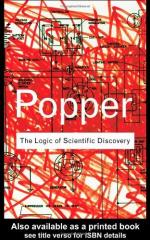
|
| Name: _________________________ | Period: ___________________ |
This test consists of 15 multiple choice questions and 5 short answer questions.
Multiple Choice Questions
1. In addition to theories not being falsifiable, what else does Popper say about theories?
(a) They are subject to interpretation.
(b) They are not unique.
(c) They are unique.
(d) They are not verifiable.
2. Where does information about precision come from?
(a) Examining ranges.
(b) Examining assumed information.
(c) Examining objective information.
(d) Examining concrete information.
3. In chapter 9, what does Popper use to test his probability theory?
(a) Psychology.
(b) Quantum physics.
(c) Biology.
(d) Mathematics.
4. What should researchers abstain from doing with regard to the probabilities of their research?
(a) Basing research on assumptions.
(b) Referring to logic.
(c) Using determinants.
(d) Issuing prohibitions.
5. What is complimentary to the degree of falsifiability?
(a) Probability.
(b) Justifications.
(c) Empty classes.
(d) Logic.
6. Who does Popper suggest works in probabilistic logic to determine the probability of a hypothesis?
(a) Conventionalists.
(b) Metaphysicists.
(c) Inductivists.
(d) Positivist.
7. How do conventionalists define simplicity?
(a) Unpractical.
(b) As a means to an end.
(c) As a unified practice.
(d) Aesthetic and practical.
8. What is used to make laws based on observations?
(a) Conventionalism.
(b) Probability.
(c) Theory.
(d) Simplicity.
9. How does Popper describe the link between the hypothesis and physical selections in Heisenberg's theory?
(a) There is no valid connection.
(b) They are inseparable.
(c) They are separable.
(d) Quantum physics must be considered.
10. What type of classes are singled out and can not be subject to the rigors of scientific empirical scrutiny?
(a) Unified classes.
(b) Sub-classes.
(c) Empty classes.
(d) Unique classes.
11. What does Popper feel about normally attained simplicity?
(a) It is logical.
(b) It serves to provide a justification.
(c) It is too subjective.
(d) It is untenable.
12. What is directly linked to falsification?
(a) Theory.
(b) Logic.
(c) Testability.
(d) Statements.
13. What does Popper state cannot be applied to a sequence of events?
(a) Objective methods.
(b) Scientific rules.
(c) Mathematical rules.
(d) Theory.
14. What has a limited utility in comparing falsifiers?
(a) Sub-justifications.
(b) Sub-classes.
(c) Sub-tests.
(d) Sub-dimensions.
15. What concept does Popper consider probability to be outside of?
(a) Conventionalism.
(b) Simplicity.
(c) Positivism.
(d) Falsification.
Short Answer Questions
1. What are hypothetical estimates of frequency?
2. By seeking the highest degree of universality and precision, what type of content results?
3. How does Popper explain the differences in his selection process?
4. What is able to refute portions of old theories?
5. How does Popper negate positivist notions regarding the meaninglessness of certain scientific statements?
|
This section contains 392 words (approx. 2 pages at 300 words per page) |

|




